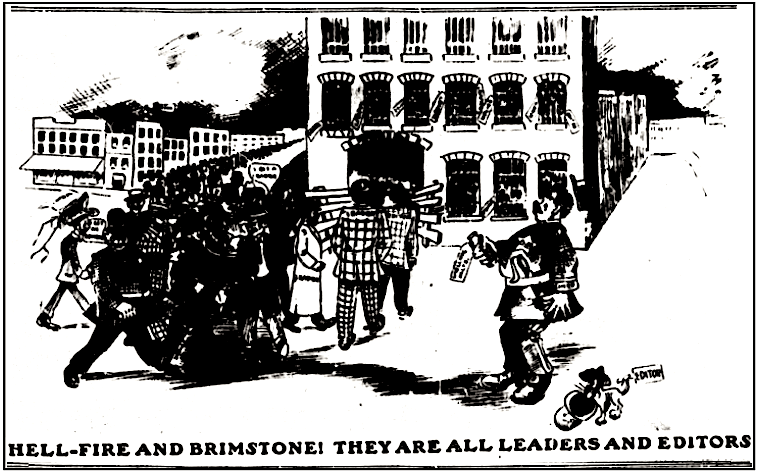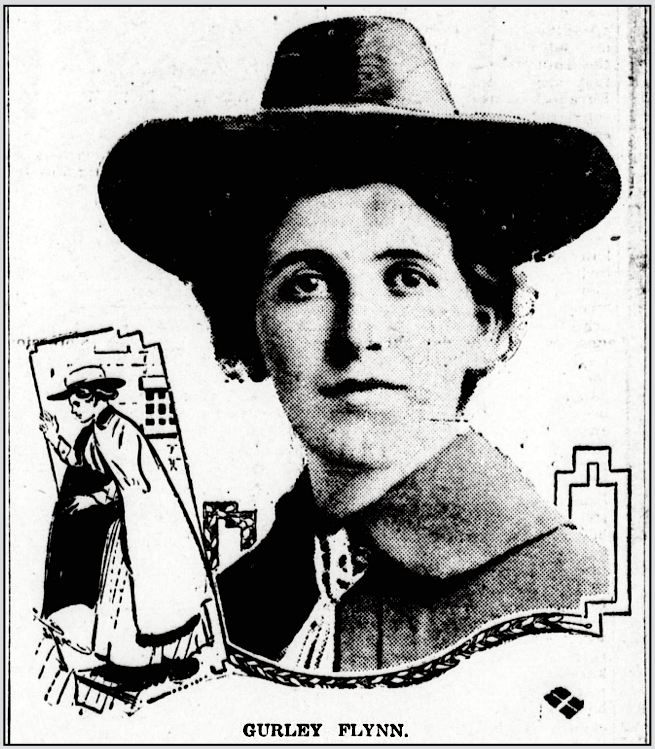 ———-
———-
Hellraisers Journal – Monday March 14, 1910
Spokane, Washington – Spokane Free Speech Fight Settled
From the Industrial Worker of March 12, 1910:
Spokane Fight for Free Speech Settled
—–
Spokane, Wash, March 6, 1910.—At last the great Spokane battle has been brought to a close. This was effected through the instrumentality of a series of conferences between the city and county officials and an I. W. W. committee. The following is an account of the various conferences and the conclusions arrived at by the contestants in this long battle.
On February 28th “the executive or fighting committee” of the I. W. W. elected a committee of three—Fellow Workers Gillespie, McKelvey, and Foster—and commissioned them to call on the authorities and discuss the situation before opening hostilities on the morrow. This interview terminated in practically a declaration of war on both sides, as the mayor seemed to think the only possible solution of the difficulty was to test the ordinance in the court. He frankly stated that he did not endorse a prohibitive or discriminatory ordinance, but said he had no other choice than to enforce the laws already on the books. He professed willingness to treat on the matter, but claimed lack of jurisdiction. This was considered unfavorable by the committee, and the mayor was told that the fight must continue until the I. W. W. was crushed or free speech assured.
Next day the committee, enlarged by the addition of Fellow Worker Stark, called on the police department, where a general conference was held. The authorities showed a willingness to reasonably consider the situation and asked for specific credentials from the committee, which would show their authority to talk business. These credentials were secured, and on March 3rd the general conference met. The city and county were represented by Mayor Pratt, Prosecuting Attorney Pugh, Corporation Counsel Blair, Chief of Police Sullivan, and Captain Detective Burns. The I. W. W. were represented by Fellow Workers Stark, McKelvey, Gillespie, and Foster.
The conference took on the nature of demands by the I. W. W. These were four in number: First, the promise that landlords would not be intimidated into refusing the rent of halls to the I. W. W. as had been done during the last few months of the fight, and that I. W. W. meetings be absolutely free from police interference, provided, of course, that we kept within the common rules; in short, hall conditions were to be the same as those prior to November 2. Second, freedom of the press and the right to sell the Industrial Worker on the street just as other newspapers are. Third, the release of I. W. W. prisoners in the city and county jails. Fourth, the use of the streets for public speaking.
The first two propositions were granted after but slight discussion. The third proposition was very closely related to the fourth, and after a very unsatisfactory discussion of it the committees turned to the fourth so as to find out how they stood on that. The mayor, corporation counsel, etc., assured the I. W. W. committee that free speech is to be allowed in Spokane in the near future, and though no date was or could be set for this new arrangement to take effect, they were positively assured that it will be in a short while. And meanwhile the regular religious organizations will not be discriminated in favor of, but must await the time when the streets are open to all.
With this proposition established as a working basis, the conference again took up the matter of the release of prisoners, which was a delicate one to handle. Prosecutor Pugh professed to have no animosity against any of the prisoners, but stated that it is impossible to release them all at once. It was agreed that the city prisoners (some 15 in number) should be immediately released, and the county prisoners (14 in number) released on a sliding scale, to begin immediately, without discrimination.
In return for these concessions he demanded a hostage in the shape of National Organizer F.W. Heslewood, who was then vigorously fighting extradition proceedings at Coeur d’Alene City, Idaho. The conference came to a stumbling block here, as the I. W. W. committee had no jurisdiction over Heslewood, who is employed at Coeur d’Alene by the national headquarters. To obviate this difficulty it was necessary to put the proposition before Heslewood, so the conference adjourned, to meet again in Coeur d’Alene three hours later.
Owing to poor connections Heslewood could not be reached before 7:15 pm, and the final extradition proceedings, scheduled to start at 7:30 pm, were postponed while the conference met in Judge Dunn’s private chambers. Meanwhile the committee had been increased by E. Gurley Flynn, Heslewood, and Attorney Moore. The situation was outlined to them and the further proposition made to Heslewood that if he surrendered himself he would be released on $2,000 bond and his case continued from time to time, for 90 days, when it would be dropped. Filigno’s case is to be allowed to vegetate also, and it too will be dismissed at the end of 90 days. Meanwhile the appeal will pend and he be allowed his release on bonds.
The Burns case and damage suits against the city are to be dropped. This decision, as far as Heslewood was concerned, could not be postponed, as the court was waiting while the committees conferred, and upon the strongest recommendations of the I. W. W. committee Heslewood accepted the terms in so far as he was concerned. The effect of this was not to bind the organization in any way. Heslewood simply placed his head in the lion’s mouth at the instigation of the committee and his own belief that the rank and file, on referendum, would accept the conditions jointly agreed upon. The next day he surrendered himself to Spokane County and is now out on bonds. The following evening at a mass meeting in Hillyard, composed of all the I. W. W. members in town, regardless of where they hail from, the action of the committee was endorsed and the street fight was officially declared off, pending the good faith of the authorities.
The conference committee has visited the boys in the county jail and explained the situation. They also have endorse the action taken. The city prisoners were released by Chief Sullivan according to the agreement. The charters seized by the police in the raid on the hall have been returned.
Central Executive Committee,
Spokane Locals I. W. W.[Paragraph breaks, photographs, and emphasis added.]
~~~~~~~~~~~~~~~~~~~~~~
SOURCES
Quote EGF, re Spk FSF, ISR p618, Jan 1910
https://play.google.com/books/reader?id=MVhIAAAAYAAJ&printsec=frontcover&pg=GBS.PA618
Industrial Worker
(Seattle, Washington)
-Mar 12, 1910
https://www.marxists.org/history/usa/pubs/industrialworker/iw/v1n51-mar-12-1910-IW.pdf
http://www.marxisthistory.org/history/usa/unions/iww/1910/0306-iww-spokanefightsettled.pdf
IMAGES
IWW Spk FSF, Leaders n Editors, IW p1, Nov 17, 1909
https://www.marxists.org/history/usa/pubs/industrialworker/iw/v1n35-nov-17-1909-IW.pdf
IWW Spk FSF EGF, Spk Prs p5, Jan 2, 1910
https://chroniclingamerica.loc.gov/lccn/sn88085947/1910-01-02/ed-1/seq-5/
See also:
Tag: Spokane Free Speech Fight of 1909-1910
https://weneverforget.org/tag/spokane-free-speech-fight-of-1909-1910/
~~~~~~~~~~~~~~~~~~~~~~~~~~~~~~~~~~~~~~~~~~~~~
There Is Power in a Union


